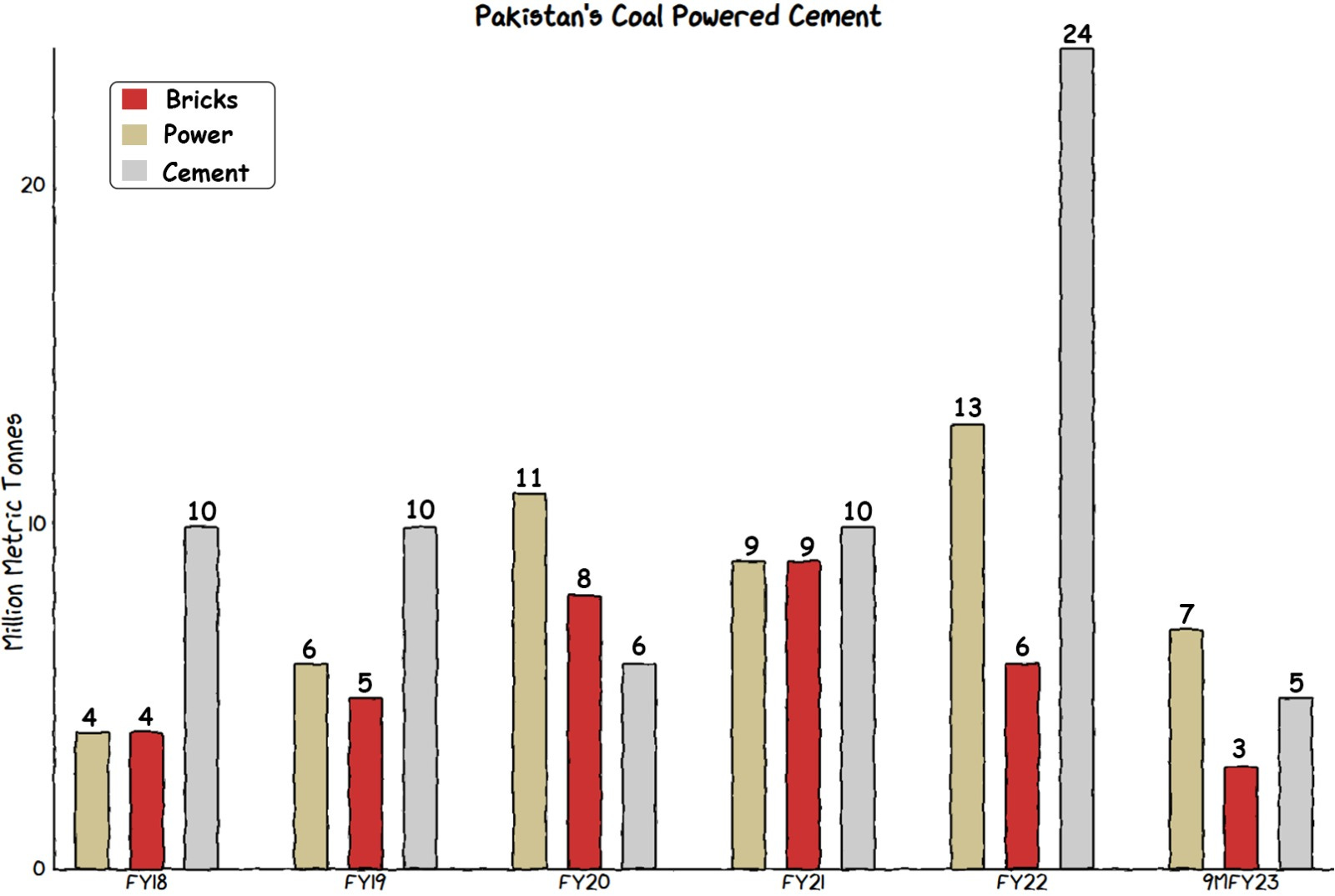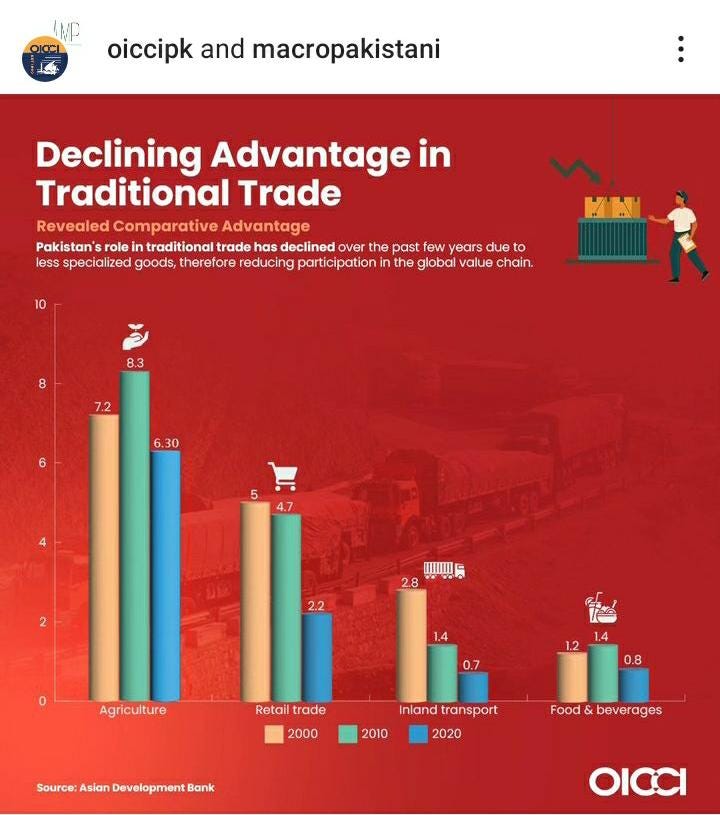Pakistan's Coal Powered Cement
Cement sales rose by 3.85% (YoY) last month, catalyzing the stock market high. Although reliance on coal remains a significant area of concern.

In 2021, the cement industry in Pakistan accounted for 68.7% of the total coal consumption in the industrial sector and 51.4% of Pakistan's overall net primary energy supply. At the same time, cement industry constituted around 44.5% - 52% of total industrial emissions. The sector is unarguably one of the highest consumers of coal, and an essential component of growth in the construction sector. As Pakistan’s coal supply, imported and local, has diminished the sector has been riddled with higher input costs and diminished demand.
In conclusion, the optimization of cement production in Pakistan can not only reduce pressure on import bill, but also enhance cost-effectiveness and export potential of the industry.
With many avenues for improvement, why is the Ministry of Science and Technology only interested in making manufacturing/expiry dates mandatory on packaging?
One prevalent issue with many industries and sectors in Pakistan is the lack of support for their growth, while there is a tendency to impose taxes or tariffs once they begin to generate profits. As the sector consumes the highest percentage of energy, it is imperative to rationalize energy usage in the sector whilst also promoting exports. Thus far, Pakistan has shown limited initiatives in both the public sector and scientific academia to embrace alternative energy sources beyond coal. This resulted in reduced capacity utilization which fell to 55% during FY23, due to reliance on imported coal.
Pakistan’s growth dreams and net-zero ambitions hinge on the industrial sectors. Decarbonization of the cement sector won’t only reduce the sector’s carbon emissions, but also create export opportunities as production becomes more cost effective. In fact, implementing energy-efficient measures in 22 cement plants could save around 0.18 MTOE by 2025. To reach this target, securing $500 million is necessary, which can be accomplished via various funding options. However, linkages between public, private sectors and academia are crucial to the transformation.
GRAPHIC
Risking arrest, probation, legal fees and above all their future, students are protesting against the Israeli onslaught and advocating for Palestine. The 'student spring protest' has surged in the US, urging an end to Israel's "genocidal campaign" in Gaza and calling for university divestment from corporations backing Tel Aviv and facilitating the barbaric genocide being conducted by the Israeli Occupation Forces (IOF) for almost 7 months now.
The US tech and the venture capital community, which is so heavily integrated within Israel has sided with Israel since the begining of the genocide. CEOs and senior executives of US-based tech and VC funds from Meetup.com, Apollo, TPG, Susquehanna Growth Equity, Mastercard, John Deere and Harvard University's endowment investment fund have expressed solidarity with Israel.
What’s more, acting on the concept is discouraged by law in more than half of US states, including New York and California, and is fiercely opposed by many donors and alumni of the universities.
Yet it’s gaining proponents, especially among students at elite universities since October 7, 2023 when Israel started its genocidal campaign Gaza that has killed more than 33,500 innocent Palestinians while innumerable remain buried under the rubble.
Most of the Israeli startups are also backed by the US, on October 12, 2023, just 4 days after Israel started its barbaric genocide in Gaza, a joint letter was issued by startup investors to provide support for the state of Israel and its tech community. Almost 221 firms signed at launch (later crossing 500).
VC firms such as Bain Capital Ventures, Bessemer Venture Partners, GGV Capital and 8VC were among those that were the early contributors calling for the global investor community to support the tech ecosystem in Israel, which accounts for nearly 20% of its gross domestic product (GDP).
Israeli high-tech firms raised $1.74 billion in the first quarter of 2024, largely flat from a year earlier, but the investors are still bullish on Israeli economy. The deep-tech companies (technologies based on innovative scientific or engineering advancements in AI, biotechnology, quantum computing, and nanotechnology) raised $41 million in 2023.
The deep tech is playing an instrumental role in the current genocide as Israel is “testing” all its latest technology to kill thousands of innocent Palestinians in the Gaza Strip. The Israeli Occupation Forces (IOF) has long burnished its reputation for technical prowess and has previously made bold but unverifiable claims about harnessing new technology. As tech startups continue to raise funds despite Israel's genocidal campaign in Gaza, it is noteworthy that 15% of Israel’s tech force has been deployed for reserve military duty to facilitate the current genocide.
Ron Miasnik of Bain Capital Ventures while expressing solidarity with Israel during December 2023 said he had expected Israeli startups to go on drawing large sums. He said he believed the country's economy would ultimately bounce back. "It doesn't matter to us whether the economic rebound takes 3 months, 6 months, 9 months or 12 months," he said. "We're long-term bullish on Israel." The deplorable part is that anyone bullish on Israel is actually bullish on the current genocide too.
Over recent years, Pakistan's traditional trade has witnessed a decline, attributed to a decrease in specialized goods and a subsequent reduction in participation within the global value chain.
However, amidst this trend, trade in services has displayed resilience, showing a reduced vulnerability to external factors.
Data Visualization & Marketing Partner: Brand Nib
Visit: https://macropakistani.com/advertise/
Grateful for the ever-growing list of collaborators!
About Us: Macro Pakistani is a data-driven research platform that aims to provide a basic understanding of Pakistan’s economy. If you have an interest in contemporary news but are currently overburdened with sensationalism and specialized vocabulary, we are the platform for you.
How are we doing? Please send us any questions, comments or suggestions by replying to this email.






